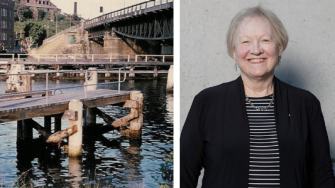
Elizabeth Taylor has enjoyed a 40-year engineering career that has been technically and personally rewarding. As a site-based civil engineer her creativity flourished. Then, when life circumstances changed, her eyes opened to the vital question, “Is the engineering status quo the best way to proceed?” and she embarked on a new challenge to change the engineering curriculum.
Today, she improves disaster response overseas, enhances the purchasing potential of the Australian Defence Force, and facilitates pathways for Australian-trained engineers to work overseas.
Sounds like you’re keeping busy! Can you describe your volunteer role with humanitarian response agency RedR Australia?
RedR selects, trains and deploys technical specialists to assist in areas affected by natural or human-made disaster. My role draws on my experience as an engineer, and my understanding of issues that can arise in traumatic situations, to make sure that the most competent people are deployed to help those in need in times of disaster.
What does your consulting work for the Australian Defence Force involve?
I’m concerned with quality assurance. There are many diverse issues that impact on how you buy and sustain a submarine or helicopter, for example. I support those managing the complexity in order to make the best capability outcome for the Australian public.
And how do you enable Australian engineers to work overseas?
I’m Chair of an International Accord through which countries agree to give mutual recognition of each other’s tertiary-level qualifications. Our work means that Australian engineers can work in 20 countries around the world.
Why do you find your work so interesting?
I’ve always been very proud to be an engineer, but I’m aware that many of the problems we face today are there because engineers didn't ask many questions outside their technical areas. This created solutions that have not been in the best long-term interests of humanity or the planet. My main driver is to promote a better understanding of complexity and bring that complexity into engineering education and practice.
How can the next generation of engineers avoid those pitfalls?
They must be open, inclusive and listen to diverse opinions. I certainly think that younger people are far more sophisticated about that than I and my peers were when we started engineering.
When did your own thinking jump tracks into this more sophisticated mode?
After I had my first child, I started a role as an Engineering Coordinator at UTS in a job-share with a feminist mathematician. Every time I made an assertion about how the world operates, she asked me why I believed that. It changed my thinking completely and I started to see systemic issues in the profession.
We took our concerns to the Dean of Engineering – I believe our exact words were, “We will not take any more lambs to the slaughter,” and he offered me an academic role saying if I wanted things to change, the curriculum would be a good start.
Can you describe a career highlight?
The first jetty I ever designed is right up there! It’s a timber jetty still in use on Sydney harbour. It represents all the motivating factors which made me get into engineering in the first place: it’s a beautiful creation that is both useful and improves peoples’ safety.
What career advice would you give your 13 to 18-year-old self?
Never think there's a dumb question and make sure you keep your work/life balance really under control.
